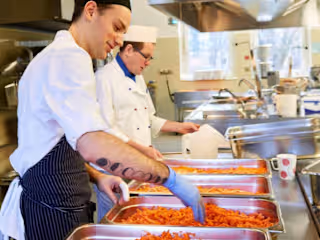Food Hygiene Certification Content Creation

Food Hygiene Cert: Why It’s a Must for Anyone Working with Food
If you are planning to work in a restaurant, food stall, catering business, or even as a food delivery person, one thing you will always need is a Food Hygiene Cert. This cert (short for certificate) proves that you have been trained to handle food safely and prevent contamination.
Food hygiene is not just about clean hands and tidy kitchens. It’s about following proper rules and methods to make sure the food served is safe to eat. This is why many countries, including Singapore, require food workers to complete an approved training course and get certified before starting work.
In this article, we’ll explain everything you need to know about the Food Hygiene Cert — what it is, why you need it, who should get it, and how to get certified.
What is a Food Hygiene Cert?
A Food Hygiene Cert is an official document you receive after completing a recognised food hygiene training course. It confirms that you know how to handle food in a clean and safe way, following basic rules for hygiene, storage, cooking, and serving.
In many places, this certification is part of the national food safety program and is issued by approved training providers. For example, in Singapore, it is given after passing the WSQ Food Safety Course Level 1.
This cert is a must for anyone who prepares, serves, packs, or handles food as part of their job.
Why is the Food Hygiene Cert Important?
Getting this certificate is not just about ticking a box. It plays a very important role in food safety, public health, and your own career in the food industry.
✅ Keeps Food Safe
Food that is not handled properly can carry harmful bacteria and cause food poisoning. A trained food handler knows how to prevent this.
✅ Required by Law
In many countries, food authorities have made it compulsory for all food handlers to be certified. Without it, you cannot legally work in a food-related job.
✅ Boosts Job Chances
Many employers won’t even consider your application if you don’t already have a valid Food Hygiene Cert.
✅ Protects Business Reputation
If an F&B outlet has certified staff, it’s more likely to pass inspections and maintain a high hygiene grade.
✅ Builds Professional Confidence
With proper training, you’ll know how to handle food the right way — no guessing, no mistakes.
Who Needs a Food Hygiene Cert?
You should get a Food Hygiene Cert if your job involves direct contact with food. This includes:
Cooks and kitchen assistants
Hawker stall workers
Waiters and buffet staff
Catering crew
Food delivery riders (if handling unpackaged food)
Baristas and drink stall workers
Bakery staff
Food factory or production staff
Cold storage or supermarket food handlers
Even part-time and temporary workers are required to get certified before they start handling food.
What Will You Learn During the Training?
To get your Food Hygiene Cert, you must attend a short training course that covers all the basics of food safety. Here are the main topics:
🧼 Personal Hygiene
Correct handwashing steps
Use of gloves, masks, and protective clothing
When not to handle food (e.g. when sick)
🥩 Safe Food Handling
Separation of raw and cooked food
Use of clean tools and utensils
Safe thawing, cooking, and reheating techniques
🧊 Food Storage
Ideal fridge and freezer temperatures
How to store food to avoid spoilage
FIFO method (First In, First Out)
⚠️ Cross-Contamination Prevention
Color-coded chopping boards and knives
Avoiding direct contact between food and unclean surfaces
🧽 Cleaning and Sanitising
How to clean surfaces, equipment, and utensils properly
Using sanitisers safely
Cleaning schedules
🤒 Foodborne Illnesses
Common food-related bacteria and viruses
Symptoms and prevention
Importance of reporting sickness
These topics are taught using simple language, videos, pictures, and sometimes hands-on practice.
How Long is the Course?
The course that leads to the Food Hygiene Cert is short and easy to complete.
Duration: 1 full day (around 8 to 9 hours including breaks)
Format: Classroom training or blended learning
Languages Offered: English, Mandarin, Tamil, Malay (varies by provider)
After the training, there will be a small test to check what you’ve learned.
What is the Test Like?
The final assessment usually includes:
Written Test: Multiple-choice or short answer questions
Practical Test: Simple tasks like showing how to wash hands or clean a surface properly
Don’t worry — the tests are not difficult. If you pay attention during training, you will pass easily.
When Will You Get the Food Hygiene Cert?
Once you pass the test, you will receive your Food Hygiene Cert within a few days. Some training providers issue it immediately, while others send it by email or post.
Always keep a copy with you. You may be asked to show it during job interviews, audits, or inspections.
How Long is the Cert Valid?
In most places, the Food Hygiene Cert is valid for 5 years. After that, you’ll need to take a refresher course to keep your certification active.
Renewing it is usually simpler and shorter than the original course.
Course Fees and Subsidies
The cost depends on your country and the training provider. Here’s a general idea:
Standard Cost: Around $130 to $160
Subsidies: Government schemes like SkillsFuture (in Singapore) may cover 70% to 90% of the fee
Refresher Courses: Usually cost less than the full course
Some employers also sponsor their staff, especially if food hygiene training is part of the onboarding process.
Who Can Take the Course?
There are no strict entry requirements. Anyone who wants to work in a food-related job can take this course. However, you must:
Be at least 16 years old
Be able to understand basic instructions in the course language
Be physically fit enough to perform basic kitchen tasks
How to Register for the Course?
Registering is simple. Just follow these steps:
Choose a training provider near you
Select a date and time that works for you
Fill out a registration form (online or offline)
Make the payment or check for subsidies
Attend the class and complete the assessment
Receive your Food Hygiene Cert
When to Take a Refresher Course?
If your certificate is about to expire (within 5 years), it’s time to take a refresher course. This course updates your knowledge and is usually:
Shorter in duration (3–4 hours)
Less expensive
Focused on latest hygiene rules and changes in food safety laws
Benefits of Having a Food Hygiene Cert
Here’s how this simple certificate helps in big ways:
✅ Lets you legally work in food businesses
✅ Makes your job application stronger
✅ Keeps customers and employers safe
✅ Reduces chances of food poisoning incidents
✅ Helps you follow rules during inspections
✅ Boosts your chances for promotion or supervisory roles
Conclusion
A Food Hygiene Cert is your key to working in the food industry. It’s not a difficult or expensive process, but it’s very important. With just one day of training, you’ll learn how to keep food safe, avoid mistakes, and follow the law.
Whether you’re starting your first job in a hawker stall, looking to move up in your restaurant career, or just want to do your job better — this cert is for you. It proves that you know the basics of clean, safe, and responsible food handling.
So don’t delay. Sign up for a food hygiene course, get your cert, and take the first step toward a professional food career.
Like this project
Posted May 15, 2025
Created content on the importance of Food Hygiene Certification for food industry workers.
Likes
0
Views
0







